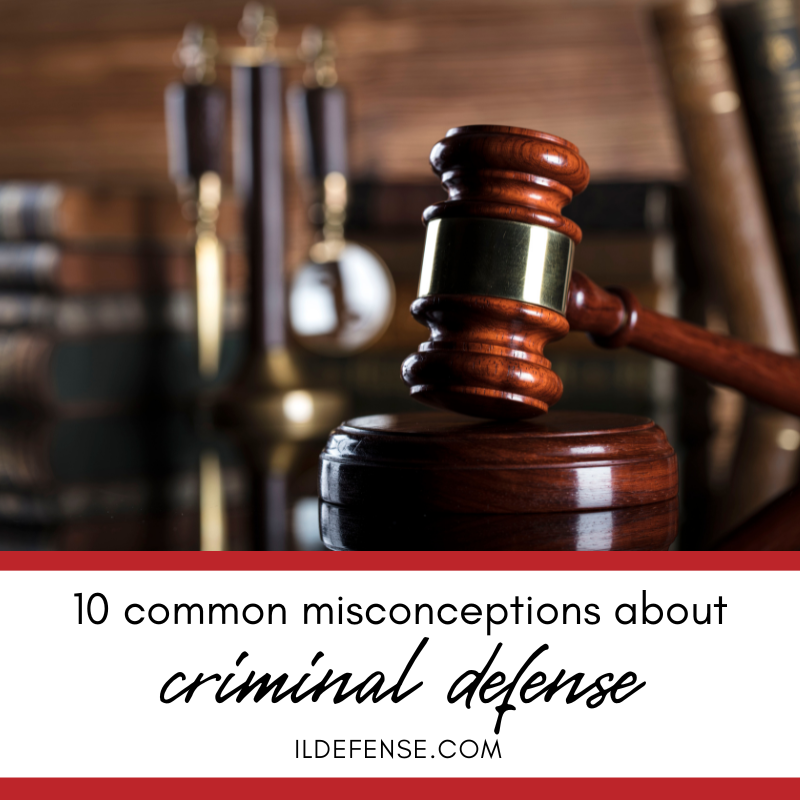
In the world of criminal defense, misconceptions abound, especially in a city like Chicago with its complex legal landscape. This guide aims to debunk some of the most common myths and misconceptions about criminal defense in the Windy City, helping you better understand the legal system and your rights.
10 Common Misconceptions About Criminal Defense in Chicago
This guide explains the following:
- Everyone Gets a Public Defender
- Innocent Until Proven Guilty Only Applies in Court
- You Must Testify in Your Own Defense
- A Guilty Plea Means No Trial
- Police Need a Warrant to Arrest You
- Prosecutors Always Have Strong Evidence
- All Lawyers Are the Same
- The Miranda Warning Is Always Required
- A Case Dismissal Means You’re Off the Hook
- You Can’t Change Your Lawyer
Here’s a closer look at each.
Everyone Gets a Public Defender
It’s a common belief that everyone is entitled to a public defender, but that’s not the case. Public defenders are provided for individuals who can’t afford a private attorney, and you must qualify based on your financial situation. If you don’t meet the criteria, you’ll need to hire your own attorney.
Related: Why is it so important to hire a criminal defense lawyer?
Innocent Until Proven Guilty Only Applies in Court
The presumption of innocence is a fundamental right in the American justice system. However, this doesn’t mean you’ll always be treated as innocent outside the courtroom. While you have the right to be considered innocent until proven guilty in court, societal and media biases may still work against you.
You Must Testify in Your Own Defense
It’s your choice whether to testify in your own defense. Your attorney may advise you not to take the stand if they believe it could hurt your case. Remember, it’s the prosecution’s job to prove your guilt beyond a reasonable doubt, not your responsibility to prove your innocence.
A Guilty Plea Means No Trial
Pleading guilty doesn’t always mean you won’t go to trial. In some cases, your attorney may advise you to plead guilty to a lesser charge in exchange for a more lenient sentence. This is called a plea bargain, and it can be an effective strategy in certain situations.
Related: Understanding Miranda rights
Police Need a Warrant to Arrest You
While it’s true that police generally need a warrant to search your property, they don’t always need one to arrest you. If an officer has probable cause to believe you’ve committed a crime, they can arrest you without a warrant.
Prosecutors Always Have Strong Evidence
Some people think that if they’re charged with a crime, the prosecution must have strong evidence against them. This isn’t always true. Prosecutors sometimes proceed with weak evidence or unreliable witnesses, hoping the defendant will plead guilty to avoid trial. A skilled defense attorney can help expose these weaknesses in the prosecution’s case.
All Lawyers Are the Same
Not all lawyers have the same expertise or experience. Choosing the right attorney can make a significant difference in your case’s outcome. Look for a lawyer who specializes in criminal defense and has experience with cases similar to yours.
Related: What to expect during a criminal trial in Illinois
The Miranda Warning Is Always Required
Many people believe that if they aren’t read their Miranda rights, their case will be thrown out. While it’s true that police must read you your rights before interrogating you in custody, failure to do so doesn’t necessarily mean your case will be dismissed. However, any statements you make without being read your rights may be inadmissible in court.
A Case Dismissal Means You’re Off the Hook
If your case is dismissed, it doesn’t necessarily mean you’re in the clear. The prosecution can still refile charges, especially if new evidence comes to light. It’s essential to consult with your attorney about the implications of a dismissal and what steps to take next to protect your interests.
Related: What are the differences between jury trials and bench trials?
You Can’t Change Your Lawyer
Many people believe they’re stuck with their lawyer, even if they’re unhappy with their representation. However, you have the right to change your attorney at any time. While switching lawyers during a case can be challenging, it may be necessary if you believe your current attorney isn’t effectively representing you.
As you navigate the complexities of the criminal defense process in Chicago, it’s essential to have a clear understanding of your rights and the legal system. By debunking these common misconceptions, you’ll be better equipped to make informed decisions and protect your interests.
Do You Need to Talk to an Attorney?
If you’ve been accused of a crime, we may be able to help you – and don’t worry: It’s completely confidential. Call us at 847-920-4540 or fill out the form below to schedule your free, private consultation with an experienced and skilled Chicago criminal defense attorney now.
Contact Us
"*" indicates required fields









